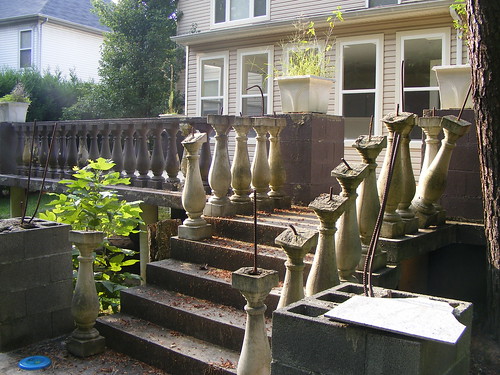
As a result she and I have become like scavengers picking through the detritus of the recession. A lot of the houses we've visited are large, respectable-looking Colonials in new neighborhoods in Olney and Germantown. They're usually empty, and what we have are the signs of the occupants' former lives: abandoned cable boxes, old pictures, a dresser with "I [heart] my family" scrawled on it in crayon. There was the house in Bowie with an elaborate deck that, after months or years of deterioration, came to look like Roman ruins.
The houses are almost always unoccupied, and if people are still living there, they're usually out for the day. But last Friday my mother had to look a little kid in the eye and tell him he's losing his house.
The house is this little cinder-block deal off Route 108 in Damascus, white with black shutters and a casually overgrown lawn. Across the street are a couple of McMansions with brick fronts and vinyl sides sitting in the middle of a field that seems to go on forever. I turn into the gravel driveway and am surprised to find that it goes behind the house, into a loose cul-de-sac with a shed, an old truck, and some people. Two young men carrying things into the shed who look up momentarily when we arrive. A boy about ten, my brother’s age, and a younger girl in a pink dress who stumbles across the yard clutching a doll, watching our car curiously.
I wanted to leave right then and there. The Realtor told my mother that people were home, but I was expecting to see them through the window, seated in front of a TV, oblivious to our presence. And they still were, sort of.
My mother gets out, taking pictures of the house, as I turn the car around, trying to be invisible. As she holds her camera up, the boy strides up to her. “What are you doing?” he asks. “I’m taking pictures of the house,” she says. Why, the boy continues. As she explains to him that his family is losing their house, another truck pulls into the driveway. It has the name of a landscaping company on the side and two ruddy-faced men in the front. We face each other; I’m blocking them, so I back up, slowly, into the yard where the little girl is still clutching her doll.
As the truck passes me, the two men inside nod at me and I nod in response. Unlike the kids, they know why I’m here, this city boy in a blue Honda and a woman taking pictures. “Do you want me to get my mom?” the little boy asks my mother, and before she can say yes he takes off to get her. My mother slides into the car next to me and we wait. A few minutes pass and no one comes out. She calls the Realtor. “I went to the house and the little boy asked me to speak with his mom,” she says, thinking out loud, “but you already told them I was coming, so I guess I don’t need to stay.” We drive away.
We live in one of the wealthiest counties in the wealthiest state in the wealthiest metropolitan area in the country but, still, there are people whose lives have fallen apart just like that. When we are back on Route 108 my mother becomes a pastor again. “It’s hard to watch that little boy and know his family is losing their home," she says. "They want me to take their hand, and I want to as well, but all I can do is put them in the arms of God.”

3 comments:
This is definitely sad. Yet I think you yourself have given all of the evidence needed to support a statement that "there is too much vacant housing for anyone to consider building more housing".
I think there is a definite need for the local government in particular, and the higher levels of government in general, to invest more heavily in relocation assistance and even in temporary housing assistance for people who lost their mortgages because they lost their jobs, and people who lost their rental residence because the owner screwed up and defaulted the mortgage.
Although this is happening more slowly and doesn't have such an obvious physical cause -- and it is also more distributed through a larger geographic area and there are no unaffected areas -- this economic event is likely to produce as much (or even more) dislocation and disruption as Hurricane Katrina or the Christmas Tsunami.
After the Christmas Tsunami, some Sri Lankan programmers worked with experts in the assistance/rescue communities and they all developed a fine application suite called Sahana, and I have installed an example instance here.
It has geographic mapping, "missing persons" and "found persons" databasing, "resource locator" databases, etc.
This should be very easy to adapt to serving the needs of people who have been dislocated from housing and it should also serve the needs of people who have empty homes into which they need to get residents.
Heck, you hook it up to a cellphone with an "unlimited texting" call plan and it can SMS mass messages.
There are resources out there and people that need them, and the biggest stumbling block is money, mostly because government worker salaries are so high and the taxpayers can't afford more taxes. Something like this Free Open Source Software could serve a pressing need and save the county a bundle in administrative overhead, not to mention software costs.
Dan, Nice post about a sad subject. The pic looks like circa 2002 Bowie deck architecture. Not my favorite time period.
Post a Comment